Best Liquid Staking Platforms in 2026

Liquid staking platforms allow users to earn rewards on cryptocurrencies while keeping their assets accessible for other uses. Instead of locking tokens away, these protocols issue liquid receipt tokens that represent the staked value and can be traded or used elsewhere.
Finding a reliable platform is difficult due to varying yields, security risks, and technical complexities. Many users struggle to balance the need for high returns with the transparency and safety required to protect their digital assets in a volatile market.
We analyzed 40 platforms to find the best options available today. Our team segmented them based on decentralization, yield performance, user experience, fees, and ecosystem integration to ensure every investor finds a suitable liquid staking product.
Top Picks: Best Platforms for 2026
- Lido - Leading Market Leader For Ethereum Staking
- Binance - Best CEX For ETH And SOL Liquid Staking
- Jito - Top Solana Protocol For Earning MEV Validator Tips
- Bybit - Great For Zero-Fee Solana And Ethereum Liquid Staking
- DoubleZero - Best For High-performance Solana Staking
- Rocket Pool - Great For Decentralized Validator Node Networks
Lido is the largest and most trusted liquid staking protocol for Ethereum (stETH). Their protocol is the highest in Total Value Locked (TVL) with over $27.5 billion in crypto assets on the platform.
Total Value Locked (TVL)
$27.5 Billion on Ethereum
Liquid Staking Yields
Ethereum (stETH) 2.9% APR
Audits
Consensys, Statemind, Certora
Compare Top Liquid Staking Platforms
1. Lido
Lido is a non-custodial liquid staking protocol launched in 2020. It currently manages $27.5 billion in Total Value Locked (TVL). Our team ranks it as the leading liquid staking platform for the 3rd year in a row due to its massive market share and reliability.
The protocol recently rolled out Lido V3, introducing stVaults for institutional-grade customization. This update allows large-scale stakers to select specific node operators. Such flexibility helps users manage risk profiles while maintaining the liquidity of their staked assets on Ethereum.
Governance is managed by the Lido DAO, which oversees the curated operator set and protocol parameters. Its native stETH token remains the most integrated asset in DeFi. This provides users with deep exit liquidity and diverse yield-bearing collateral options.
Pros
- Industry-leading liquidity ensures minimal slippage when exiting large positions.
- Massive DeFi integration offers extensive utility for the stETH token.
- The DAO structure provides transparent and community-driven protocol management.
Cons
- A 10% fee on staking rewards is higher than competitors.
- High market dominance raises concerns about Ethereum network centralization risks.
- Smart contract vulnerabilities remain a potential risk for all users.
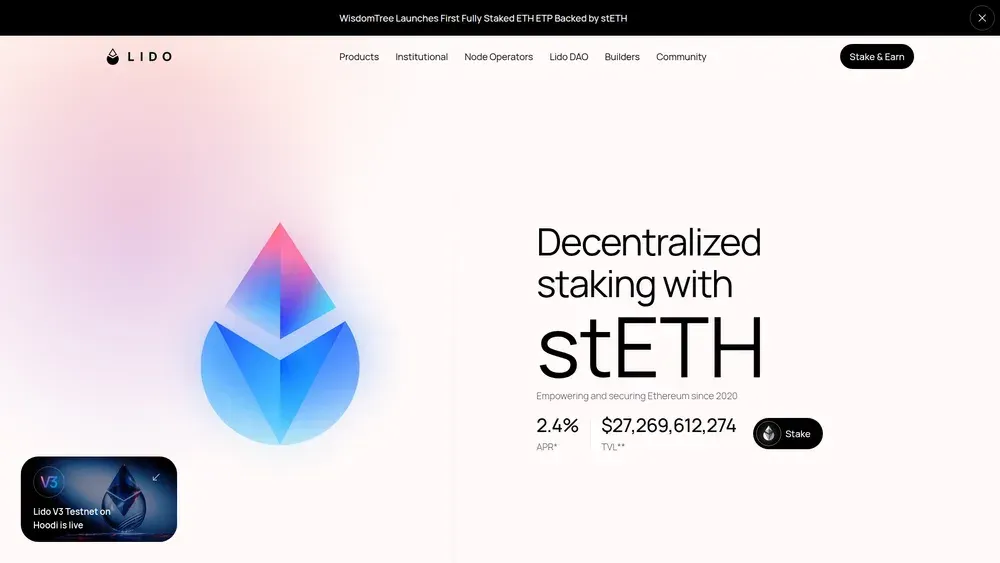
2. Binance
Binance is the centralized exchange with the largest market share in liquid staking. Founded in 2017, it manages substantial TVL across its WBETH and BNSOL products. We consider it a trustworthy custodial option for investors who are interested in earning DeFi yield in 2026.
The platform’s WBETH token represents staked Ethereum while allowing users to access liquidity across various trading pairs. Similarly, BNSOL provides a liquid version of Solana. Both assets accumulate rewards automatically through a daily conversion ratio that increases over time.
Users benefit from deep integration within the Binance ecosystem, including collateral for loans and margin trading. This connectivity simplifies the staking experience for retail investors. It eliminates the technical complexities of managing validator nodes or complex DeFi bridging.
Pros
- Highest market liquidity among all centralized exchange liquid staking providers.
- Smooth integration with Binance loans and advanced margin trading features.
- Automatic reward accumulation through the increasing token-to-asset conversion ratio.
Cons
- Centralization risks associated with using a major custodial exchange platform.
- Reward distribution depends on Binance’s internal validator performance and fees.
- Limited onchain governance compared to decentralized liquid staking alternatives.
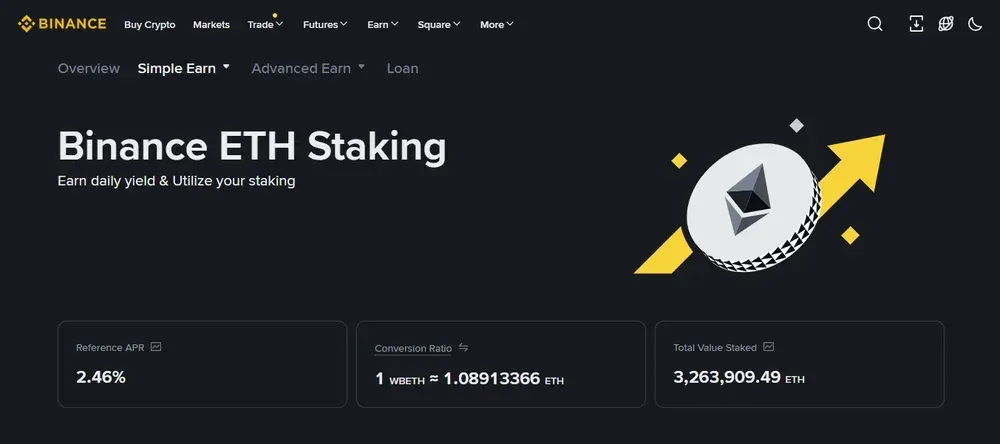
3. Jito
Jito is a specialized Solana liquid staking protocol focused on MEV extraction. We rank it as the top choice for SOL holders because it optimizes rewards through unique validator tips. It creates a highly efficient and profitable yield environment for users.
During our testing, the user interface proved exceptionally intuitive for managing JitoSOL. The dashboard clearly displays real-time MEV tips and rewards. We found that the seamless integration with major Solana wallets makes the staking process fast and simple.
The protocol charges a 5% management fee on staking rewards. It splits earnings between 6% base inflation and 1% MEV tips. This structure results in a total APY of 5.89% while maintaining high capital efficiency for all users.
Pros
- MEV integration provides higher yields than standard Solana staking protocols.
- The JitoSOL token has deep liquidity across the Solana ecosystem.
- Intuitive dashboard offers transparent tracking of all accumulated staking rewards.
Cons
- A 5% management fee reduces the net profit for stakers.
- Protocol performance depends heavily on the health of Solana network.
- Withdrawal periods may vary based on current network congestion levels.
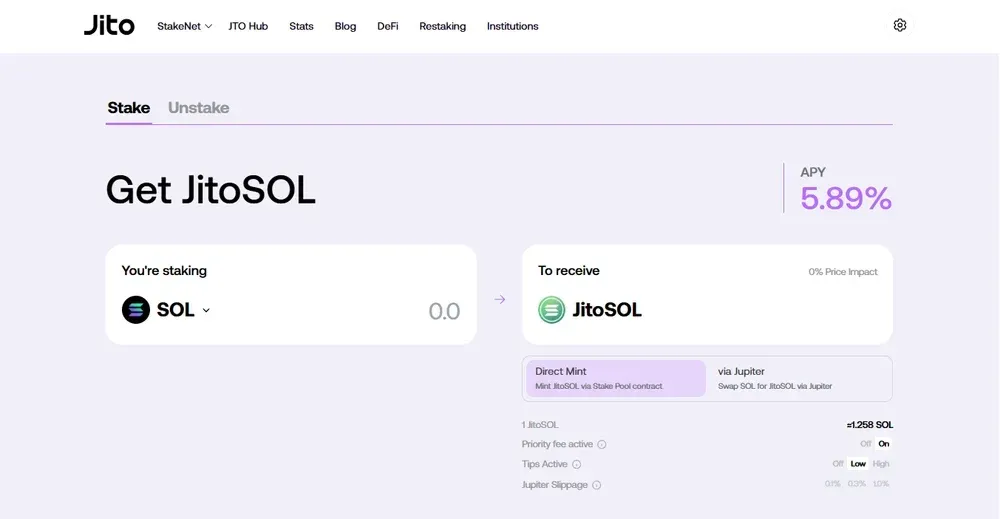
4. Bybit
Bybit is a popular centralized exchange featuring liquid staking for both Ethereum and Solana. Its bbETH and bbSOL tokens allow users to earn yields while maintaining liquidity. The platform holds a major market share among global custodial providers.
The Solana product, bbSOL, attracts users with a 0% management fee structure, though a small 0.1% deposit fee applies initially. This makes it highly competitive for SOL holders. Rewards accrue automatically through the token's increasing market value relative to SOL.
Integration with the exchange’s unified trading account allows stakers to use these assets as collateral. This setup supports seamless transitions between passive earning and active margin trading. It provides high utility for traders seeking maximum capital efficiency.
Pros
- Zero management fees for bbSOL maximize long-term earnings for users.
- High utility as collateral within the Bybit unified trading account.
- Deep exchange liquidity ensures fast entry and exit for stakers.
Cons
- A 0.1% deposit fee applies to initial Solana staking transactions.
- Custodial nature requires users to trust the exchange with keys.
- Onchain utility for bbETH is limited compared to decentralized tokens.
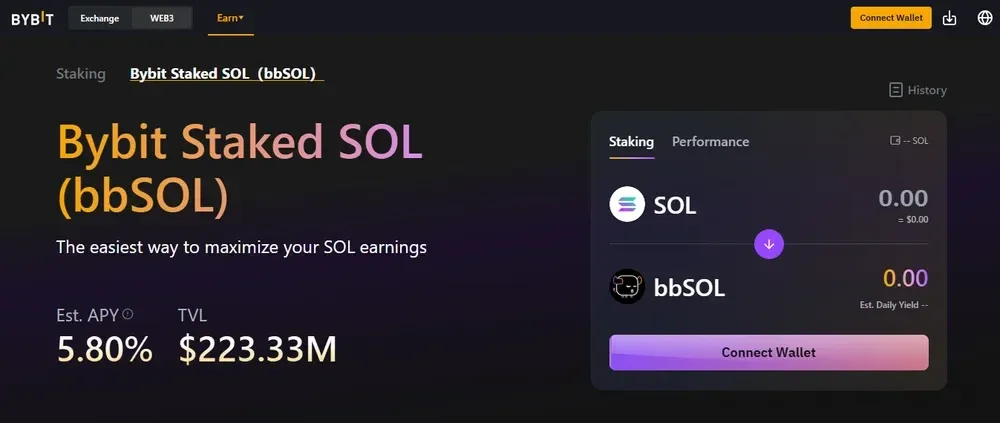
5. DoubleZero
DoubleZero is a high-performance liquid staking protocol built on the Solana blockchain. It manages $1.6 billion TVL through its specialized 2Z Staked SOL asset. The platform distinguishes itself by focusing on optimized network connectivity and validator speed and rewards.
The protocol utilizes a decentralized network layer to reduce latency for participating validators. This technological edge results in more consistent block production and higher MEV rewards. Users receive dzSOL tokens that represent their stake in this optimized infrastructure.
Stakers benefit from a performance-based reward system that incentivizes network reliability. The interface allows for simple delegation while providing transparent data on validator health. It is a powerful tool for those prioritizing technical excellence in their daily staking activities.
Pros
- Advanced network layer reduces latency for higher validator performance rewards.
- Strong TVL of $1.6 billion indicates high confidence from Solana users.
- Transparent reporting on validator health and MEV earnings is provided.
Cons
- Technical focus may be complex for many retail staking participants.
- The 2Z token ecosystem is still expanding its primary DeFi integrations.
- Slashing risks exist if underlying infrastructure providers fail to perform.
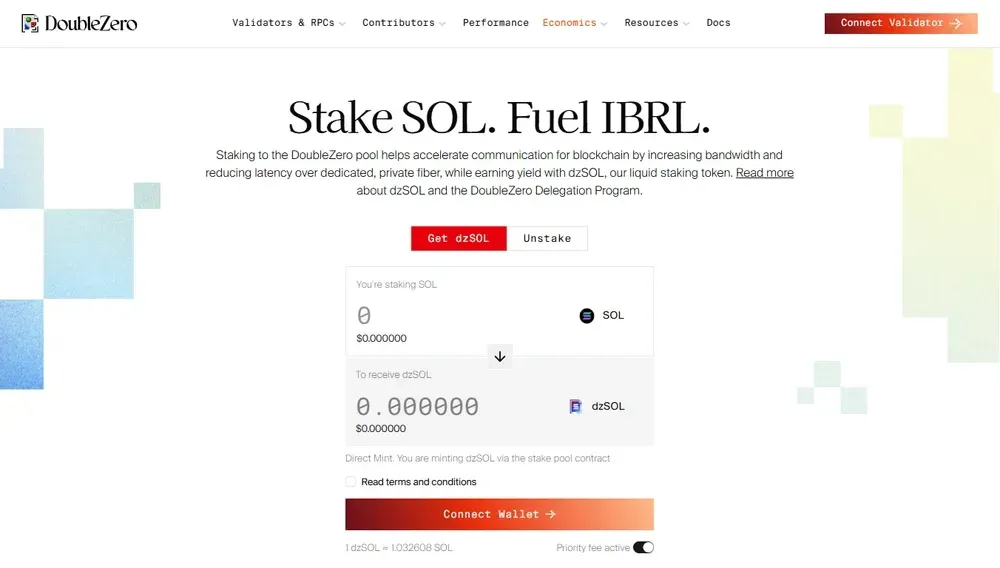
6. Rocket Pool
Last on our list is Rocket Pool, a staple player in the liquid staking game since 2021. We specifically value its permissionless node network, while one common drawback users often highlight is the higher commission compared to other competitors like Lido.
The protocol recently launched the Saturn upgrade, which introduces megapools and reduces the entry barrier for node operators to 4 ETH. This change makes it cheaper to run a validator and spreads control across more independent participants on the Ethereum network.
Investors receive rETH tokens that automatically accrue value against Ethereum through staking rewards. While the UI is simple, the deeper value lies in the trustless nature of the protocol, ensuring users retain full control over their digital assets.
Pros
- Permissionless structure allows anyone to run a validator node securely.
- The rETH token is highly integrated within major DeFi protocols.
- Saturn upgrade significantly improves capital efficiency for all node operators.
Cons
- Higher 15% commission on rewards compared to other major protocols.
- Liquidity for rETH can be lower than its centralized counterparts.
- Scaling depends heavily on attracting new independent node operator participants.
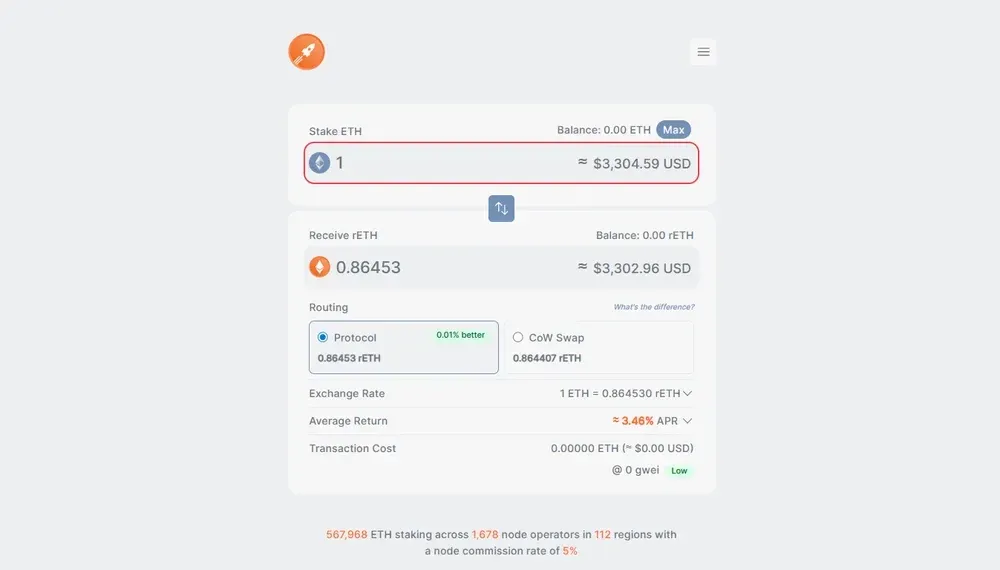
What is Liquid Staking?
Liquid staking is a mechanism allowing users to earn network rewards while maintaining asset liquidity. Instead of locking funds, users receive a receipt token representing their stake. This token can be traded or used as collateral across decentralized finance platforms.
This process is primarily possible on Proof-of-Stake networks like Ethereum and Solana. Common examples include stETH for Ethereum and JitoSOL for Solana. These assets allow investors to maximize capital utility without waiting for long unstaking periods typical of traditional methods.
Currently valued at $57.09 billion, liquid staking represents 31.56% of the decentralized market. When adding restaking ($19.32 billion) and liquid restaking ($11.49 billion), dominance grows to 48.59%. This is a major portion of the $180.91 billion total DeFi TVL.
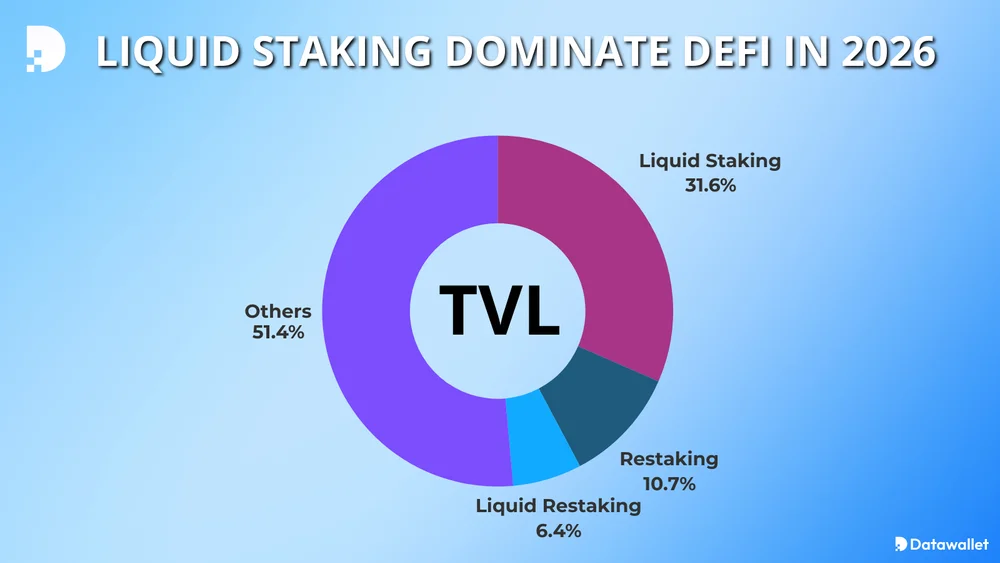
Liquid Restaking Platforms Explained
Liquid restaking platforms allow users to repurpose their staked assets to secure additional layers known as Actively Validated Services (AVSs). This mechanism extends security beyond the base layer. EigenLayer pioneered normal restaking by enabling participants to earn multiple yield streams across various decentralized infrastructures simultaneously.
The Babylon Chain brings this utility to the Bitcoin network, while protocols issue liquid restaking tokens to provide immediate liquidity. This allows for deeper participation across the decentralized finance ecosystem. Users benefit from two layers of security rewards without locking their assets.
How to Choose a Crypto Liquid Staking Platforms
Selecting the right liquid staking platform requires balancing yield potential with protocol security and asset utility. You must evaluate the underlying network support, fee structures, and the reputation of node operators to ensure your staked assets remain safe and accessible.
Step 1: Evaluate Protocol Security And Audits
Before depositing any funds, you must verify the platform's security history and the frequency of its third-party audits to mitigate potential smart contract risks.
- Audit Reports: Check for recent security audits from reputable firms like Trail of Bits.
- Bug Bounties: Ensure the protocol offers rewards for developers who identify critical vulnerabilities.
- Operator Reputation: Research the track record and reliability of the platform's validator set.
Step 2: Analyze Yields And Fee Structures
Compare the net annual percentage rate across different providers while accounting for management fees that can significantly reduce your total staking earnings over time.
- Management Fees: Confirm if the protocol takes 5% or 10% of your rewards.
- Yield Sources: Identify if the APR includes MEV tips or additional protocol incentives.
- Reward Distribution: Understand how often rewards are calculated and added to your balance.
Step 3: Check Token Liquidity And Integration
A liquid staking token is only useful if it has high trading volume and wide acceptance as collateral within the broader decentralized finance ecosystem for users.
- DEX Liquidity: Verify that you can swap your tokens back without high slippage.
- DeFi Utility: Ensure major lending protocols accept the receipt token as valid collateral.
- Withdrawal Periods: Review the time required to exit the stake through the protocol.
Liquid Staking Platforms Regulation
Regulatory bodies like the SEC and ESMA are increasingly scrutinizing liquid staking protocols. They focus on whether receipt tokens constitute unregistered securities. This attention forces many platforms to implement stricter KYC and AML procedures to satisfy global financial compliance standards.
Geographic restrictions are becoming more common as protocols attempt to avoid legal friction in the US market. Some decentralized providers now block specific IP addresses to prevent residents from accessing their services. This shift challenges the permissionless nature of decentralized finance.
Future rules may require node operators to register as financial service providers or money transmitters. Such changes would force a major restructuring of how DAOs manage their validator sets. Compliance remains a primary hurdle for long-term institutional adoption in 2026.
How is Liquid Staking Taxed Around the World?
Taxation on liquid staking varies significantly by jurisdiction, often depending on whether receipt tokens are viewed as taxable swaps or simple holding mechanisms.
Here is how different regions tax liquid staking assets:
- United States: The IRS taxes staking rewards as ordinary income (10% to 37%) the moment you have "dominion and control." If you sell them later, you also pay capital gains on any price increase.
- United Kingdom: HMRC applies income tax (20% to 45%) on rewards. Since 2024, swapping your ETH for a liquid token like stETH is officially viewed as a "disposal," potentially triggering a capital gains bill immediately.
- Germany: The Federal Ministry of Finance clarified that rewards are taxed as income at receipt. While the "10-year rule" was scrapped, you still pay income tax up to 45%; only the increase in value becomes tax-free after holding for one year.
- Australia: The ATO treats rewards as ordinary income. The big win here is the 50% CGT discount, but you only get that if you hold your liquid tokens for at least 12 months before swapping back.
- Canada: The CRA remains strict: 100% of rewards are income. For 2026, if your capital gains exceed $250,000, the inclusion rate jumps from 50% to 67%, making high-volume staking more expensive.
- Singapore: The IRAS is still a haven, but with a catch: if your rewards exceed $300 SGD, they are technically taxable income. However, they still have 0% capital gains tax, which is the real draw.
- Switzerland: The ESTV doesn't tax private capital gains, but they do have an annual Wealth Tax (0.05% to 1%). You have to report the value of your staked coins every December 31.
- Portugal: The "tax-free" dream ended in 2023. The AT now charges a flat 28% on staking rewards (Category E). Only capital gains on coins held over 365 days remain tax-free.
Are Liquid Staking Protocols Safe?
Liquid staking protocols are generally safer than many DeFi platforms due to simpler smart contracts and established mechanisms. Audits from firms like ConsenSys Diligence or STATEMIND are critical for identifying vulnerabilities and strengthening security across the entire ecosystem.
Despite this, users should be aware of potential risks:
- Smart Contract Risks: Audited and tested smart contracts reduce the likelihood of exploits, but technical vulnerabilities can never be entirely eliminated from any decentralized software.
- Key Management Risks: User-controlled keys ensure decentralization but require careful handling. If a user loses their private keys, their staked assets and rewards are gone forever.
- Regulatory Risks: Increased global scrutiny could lead to sudden restrictions on services or new tax laws, affecting how these protocols operate in specific countries.
- Slashing Risks: If a validator behaves maliciously or suffers extended downtime, a portion of the staked principal may be permanently destroyed by the network.
- De-pegging Risks: Market volatility or liquidity crunches can cause the price of the receipt token to drop below the value of the underlying staked asset.
- Governance Risks: Centralized control over protocol parameters or validator whitelists can lead to decisions that favor large stakeholders over the interests of retail investors.
Platforms like ether.fi address these concerns through proactive safeguards, recurring audits, and user education, ensuring a balanced approach to safety.
Final Thoughts
Liquid staking remains a vital pillar of the modern decentralized economy by offering investors a flexible way to earn rewards while keeping assets.
As the industry matures into 2026, selecting platforms that prioritize security audits and deep liquidity will be essential for long-term capital preservation.
The integration of restaking and multi-chain support ensures that this technology will continue to shape how users manage their digital wealth effectively.
Frequently asked questions
Is it possible to lose money while using liquid staking platforms?
Yes, users can face losses through slashing penalties if their chosen validator fails or through de-pegging, where the receipt token price falls below the value of the staked asset. Additionally, smart contract hacks remain a permanent threat to deposited funds.
How do liquid staking tokens differ from traditional interest-bearing accounts?
Unlike bank accounts, liquid staking derivatives are onchain assets that fluctuate in market price and carry no insurance like the FDIC. They provide decentralized access to network rewards rather than a fixed interest rate guaranteed by a financial institution.
Can I use liquid staking tokens for airdrop eligibility on new networks?
Holding receipt tokens like stETH or JitoSOL often qualifies users for ecosystem airdrops, as protocols track token holders to reward active participation. However, moving these tokens into certain lending pools might disqualify you if the protocol cannot track the final owner.
What is the difference between rebasing tokens and value-accruing tokens?
Rebasing tokens like Lido’s stETH increase your actual token balance in your wallet daily to reflect rewards. Value-accruing tokens, such as Rocket Pool’s rETH, stay at a constant balance but increase in price relative to the underlying asset as rewards accumulate.

Written by
Antony Bianco
Head of Research
Antony Bianco, co-founder of Datawallet, is a DeFi expert and active member of the Ethereum community who assist in zero-knowledge proof research for layer 2's. With a Master’s in Computer Science, he has made significant contributions to the crypto ecosystem, working with various DAOs on-chain.










